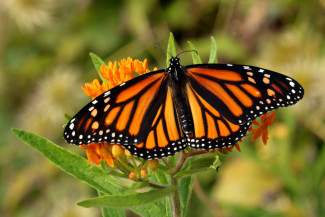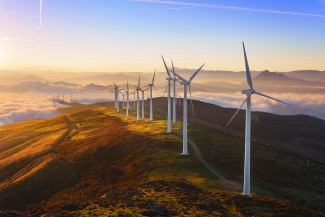

During this period of unprecedented energy expansion, land scarcity, and global change, renewable energy presents both opportunities and challenges for our sustainable energy future. The fossil fuel era will inevitably come to end, and the world is transitioning to a renewable energy future. As the human population increases exponentially, we must find ways to provide more energy to more people while sustaining natural resources for future generations. Renewable energy ecology provides a means by which to inform a sustainable energy future on Earth and conserve wildlife in light of rapid and expansive renewable energy development.
Renewable energy has obvious benefits, not the least of which is mitigating climate change through the substitution of greenhouse-gas emitting fossil fuels for electricity production, yet the “greenness” of renewable energy comes in many shades. Energy generation affects wildlife in complex and fascinating ways. The interface between renewable energy development and wildlife conservation is rich with stimulating scientific questions and interesting research stories. Ultimately, our actions at the nexus of renewable energy development and wildlife conservation must be directed by current, science-based information related to ecological effects of renewable energy development.

We proposed the idea for Renewable Energy and Wildlife Conservation because the rapid increase in renewable energy development must be matched by knowledge transfer regarding direct and indirect effects on wildlife populations. The book assimilates current scientific research and theory behind the major renewable energy technologies, including bioenergy, wind energy, solar energy, and waterpower, and their effect on animals. For each energy sector, subject matter experts led in writing chapters that describe processes to generate renewable energy, review documented effects on wildlife, provide mitigation strategies to lessen effects on wildlife, and identify research needs related to wildlife conservation. Each chapter includes a ‘Deep Dive’ section that highlights, in detail, potential wildlife impacts, research efforts, and mitigation strategies to conserve wildlife affected by renewable energy development. The book culminates with a final synthesis chapter underscoring consistent themes of the book, emerging opportunities, and recommendations for future research related to renewable energy and wildlife conservation.
The book serves as a collection of the current state of knowledge for renewable energy and wildlife conservation and provides a platform for future wildlife research in the burgeoning field of renewable energy ecology. Although wildlife professionals have made progress towards better understanding and mitigating effects of renewable energy development on wildlife, we have only uncovered the tip of the iceberg! We are presented with great opportunities to further develop our knowledge of renewable energy ecology. We hope this book not only serves as a reference, but also as a creative springboard for building renewable energy ecology to conserve wildlife into the future.
Christopher Moorman is Professor, University Faculty Scholar, and Coordinator of the Fisheries, Wildlife, and Conservation Biology Program at North Carolina State University. His teaching and research activities focus on issues related to global change and wildlife conservation. Steve Grodsky is a Postdoctoral Scholar at the University of California, Davis and Co-founder/Co-director of the Wild Energy Initiative housed within the John Muir Institute of the Environment. His research program centers on the intersection of energy development, ecology, and people, with a special emphasis on renewable energy transitions. Susan Rupp is CEO of Enviroscapes Ecological Consulting, LLC, based in northwest Arkansas. Her work largely focuses on the effects of bioenergy production on wildlife and wildlife habitat. Together, Moorman, Grodsky, and Rupp are the editors of Renewable Energy and Wildlife Conservation.